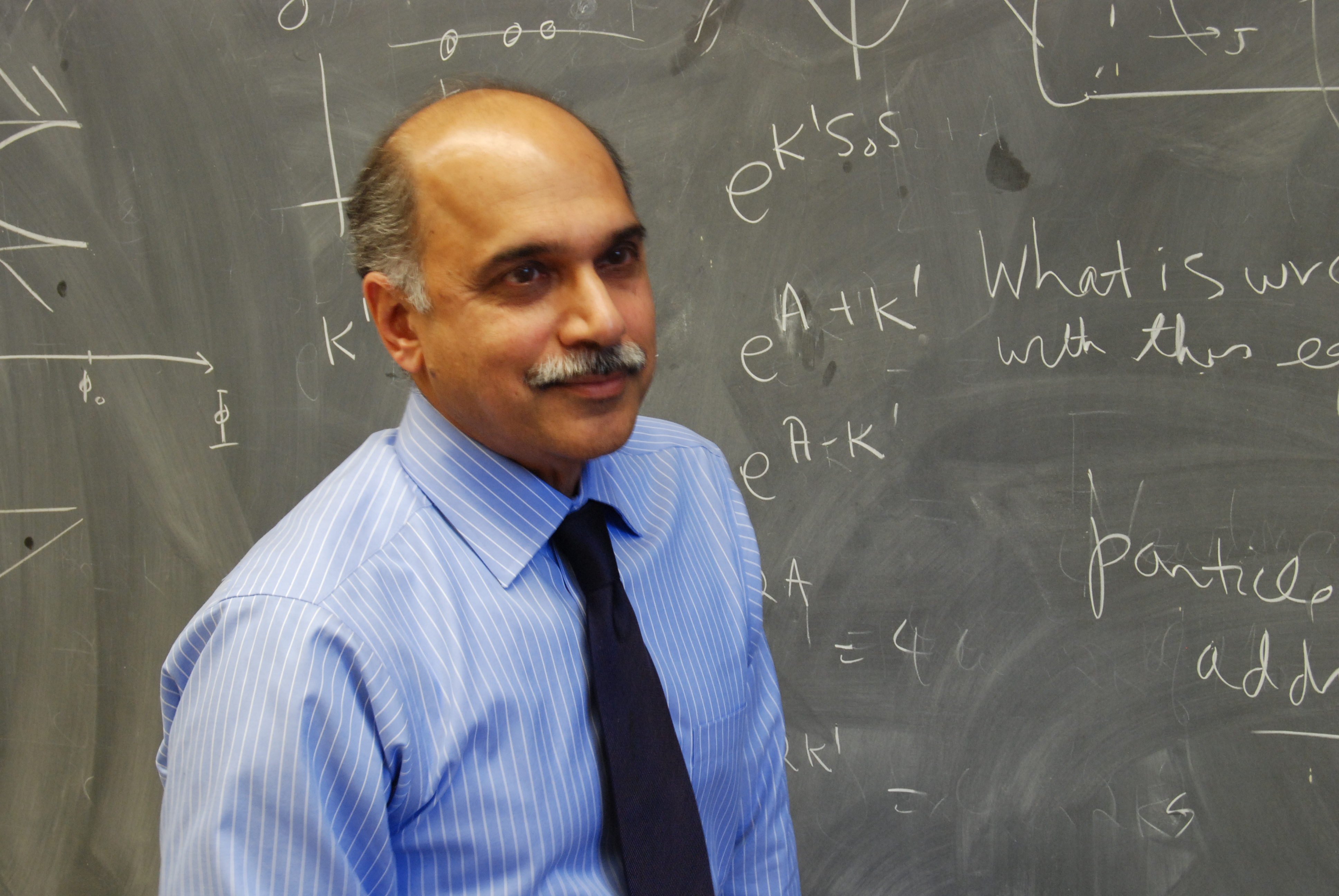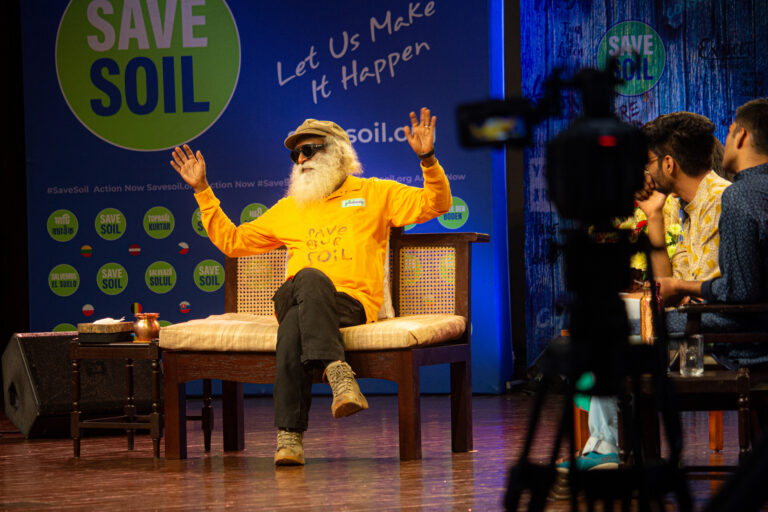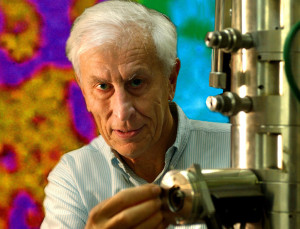Ramamurti Shankar (born April 28, 1947) is the John Randolph Huffman Professor of Physics at Yale University. His research is in theoretical condensed matter physics , although he is also known for his earlier work in theoretical particle physics. He received his B. Tech in electrical engineering from the Indian Institute of Technology Madras and his Ph.D. in theoretical particle physics from the University of California, Berkeley. After three years at the Harvard Society of Fellows, he joined the Yale physics department, which he chaired between 2001-2007. He is a fellow of the American Academy of Arts and Sciences. He is dedicated to teaching and has published three texts: Principles of Quantum Mechanics, Basic Training in Mathematicsand Fundamentals of Physics.: A Fitness Program for Science Students.
VP: Is this your first time in IIT Kanpur? How has the experience been so far?
RS: Yes it is. It’s been great.
VP: You did your B. Tech in Electrical Engineering from IIT Madras and are now one of the most respected Theoretical Physicists in the international community. How did you make the transition from engineering to pure sciences? Was it tough?
RS: It was tough because it was hard to get into IIT and once you get in you want to stay in. I had no intention of doing anything else. It is only by accident that I ran into some interesting books on Physics by Feynman. And I was reading them initially only for fun and then I realised that this is something I want to do. So I wanted to quit then and there but my father counseled me to finish what I had started. This happened in the middle of my second year. It was a five year B.Tech program. I had about three years to learn all the topics you need to go to Graduate School. So, when I finished my B.Tech, I gave the GRE and went to Berkley. It is a great place to go to because it is a very good school and yet it is big enough that it can take a gamble. They don’t know anything about me. I tell them I want to do Physics and all they have is my GRE score. Other places like Princeton which have a very small incoming batch, they will not take a risk because they have only twenty seats. Berkley has a big class, so they are able to take students from abroad in whom they take a chance.
VP: What could be the reason for the research culture in India not being well founded?
RS: I don’t know what the problems are. Money seems to be plentiful, as far as I can tell. That used to be an obstacle in the old days. Another obstacle in the old days was that journals took a long time to come here. After it was published, it took a few months to come here. Then you had to read the journal, then you had to think of an idea they nobody had, then submit it to the journal, if it was abroad, that takes another few months. Then it went to the referees, and finally the paper came out. You were about two tears behind everybody else. So, you had to be two years ahead in your thinking to make an impact. But now it’s instantaneous because of the web. All the papers we write are on the internet. That’s a great equaliser. That problem is gone. Apart from that, one problem that I imagine, which is not a problem in IIT is that researchers don’t see enough of students. They are all by themselves in the research institutions under the assumption that that’s the way to think clearly. I don’t share that view. I think it is better to have students who are always bugging you, asking questions. Going to class, teaching, you should mix the teaching and research. I think it is coming to that in many places.
VP: Sir, another pertinent question these days is an increasing percentage of people who come to IIT do not eventually end up in technology sectors or science sectors; Banking and Consulting jobs lure them with lucrative packages. Being in the teaching profession what are your views on this phenomenon?
RS: I know what you are saying; it’s a problem even in the US. Because in the graduate school we have only about twenty positions to offer. So we fight about every single slot that we offer to graduate students. In the end after 4-5 years, they got to Wall Street; well is it a gain or a loss, I cannot say; I think what it does is in the end you find what you are meant to do and if you evolve naturally, I’d rather not be the one to criticise. Look at my own life; I thought I was supposed to be an engineer but I found out I was supposed to be a physicist and if somebody would have stopped me, it would have been a loss to both parts of the world. So if somebody is a good banker and happens to go through the physics route or engineering route, I don’t see the problem as long as the motivation is not just making money and you do find banking interesting. I’d rather have a technically sound person incharge of banking than someone who is not technically strong. If you are an engineer, you learn how to quantify, approximate and model things, you are convinced by logic and reason. They are good attributes for any field; so I don’t think you should consider that a loss. It’s a little worry that people go and do something else; if they aren’t good at it they wouldn’t ask them to do it and if are good at it, you shouldn’t stop them from doing it. Now there are more seats in IITs so they can take more people.
VP: What is your secret that makes you one of the most loved Physics teacher in the world?
RS: I don’t really know the trick. I just like my subject a lot. I enjoy talking about it. Any number of times, any number of people. And I think they can feel my enthusiasm. Not everybody wants to teach. Specially in America, there is not much importance given to teaching. As an IIT student, I used to learn my subject and explain it to my classmates. And I fount thai it was very good for me. I also learnt it much better they way. And we had the culture of sharing what we knew in those days. And that helped me learn how to explain things. Another thing that I definitely owe to my IIT experience is Public Speaking. Although we didn’t have technical meets but we did have All India competitions like in debating. Debating is not part of your engineering education but it is invaluable. Once you can get up and talk to a crowd, that’s so useful when you are in a teaching profession. I don’t care if there a five, or five thousand or five hundred thousand people, you tune them out all together. And you learn to make your point in a limited time. There is no room for wasting time in the five minutes you have. I think that was very helpful. And that’s helpful even in my research because suppose you do a good piece of research. How much of it get’s recognised also depends on how well you are able to explain what you done to people. If you are invited to give a talk on what you did but if you go there and leave people in the dark, they don’t know what you did. Being able to explain stuff is not only useful in the classroom but elsewhere also.
VP: What is the message that you would like to give out to the students here in IIT Kanpur?
RS: It’s not a simple answer because I can give you some generic empty words. I advise a lot of people when they write to me but they are one on one based on the situation. I don’t have a general answer. You’ll hear enough of that when you graduate. But I do know that in my own case, I changed my field when it was risky thing to do and I ended up okay. Is it going to be everybody’s story, I don’t know but my guess is that it is easier now then it was then. I have a student who did his Electrical Engineering from Madras and joined the Yale Physics Department. He is the best student to ever work with me. And we took him in without any question. It’ s a lot easier when your predecessors have proved their value. I do not have any advice for you guys, look at the festival you are running. But I do have advice for the politicians, leave the IITs alone. They are fantastic places. Everyone asks me, “What’s the secret?”, I say, look, we know it’s a big country. It’ got many great people. What you don’t want is someone coming in between the great people and their opportunities. You want meritocracy. When I was growing up in Madras, there was a lot of regional politics regarding admission onto various regional colleges. IIT was a lighthouse of hope for us because anybody could compete and if you got in it didn’t matter where you were from. It’ purely based on merit. It’s a very simple secret and it is as powerful as anything I have ever seen. At Yale we have a very complicated admission process. Some of it on grades, some of it on extra curricular activities, this and that. IIT is based on this one number, which is your total score. It looks very one dimensional, but it is very fair because if you look at the end product. There is an old American saying, “If it ain’t broke, don’t fix it”. So, it is working well, leave it alone.
Interviewed by Samanwita Samal and Simrat Singh












